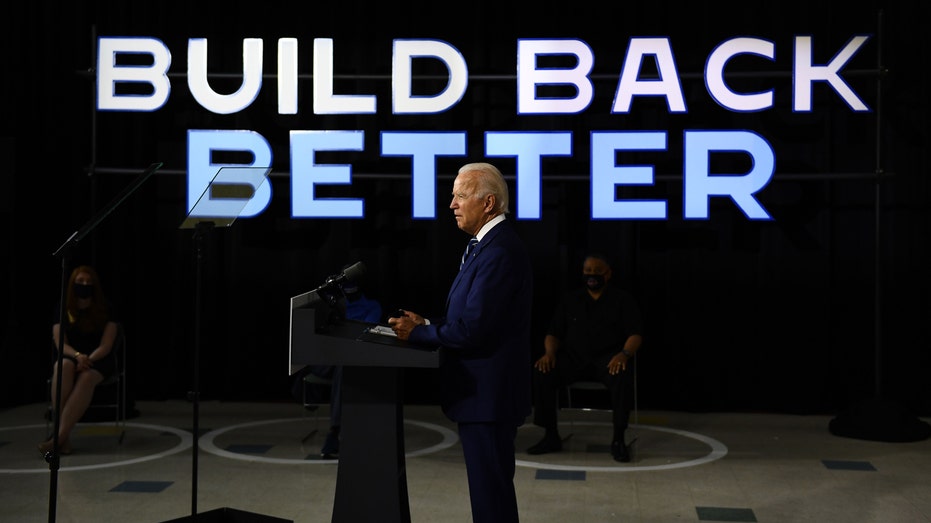Biden to meet with CEOs in push to salvage mega spending bill
CEOs of General Motors, Ford expected to attend White House meeting
Biden’s social spending bill hangs in the balance
Kansas Sen. Roger Marshall discusses criticism of Biden from progressives growing as he continues to push for ‘Build Back Better’.
President Biden will meet with the chief executives of 10 major corporations on Wednesday to promote the potential business benefits of his stalled spending bill as Democrats look to salvage key parts of the social safety net and climate change package.
The meeting includes CEOs who support Biden's signature Build Back Better plan, according to a White House official. Biden is expected to highlight how the spending plan could "make the U.S. economy more competitive, increase worker productivity and workforce participation, lower inflation over the long-term, and strengthen business growth."
WHERE ARE SURGING CONSUMER PRICES HITTING AMERICANS THE HARDEST?

Joe Biden speaks about his Build Back Better economic recovery plan while campaigning for president on July 21, 2020, in New Castle, Delaware. (Brendan Smialowski/AFP via Getty Images / Getty Images)
These are the executives participating in the meeting, according to the official.
- General Motors CEO Mary Barra
- Salesforce co-CEO and co-founder Marc Benioff
- TIAA CEO and President Thasunda Brown Duckett
- Ford CEO and President Jim Farley
- Siemens Corp. CEO and President Barbara Humpton
- Cummins CEO and Chairman Tom Linebarger
- HP CEO and President Enrique Lores
- Etsy CEO Josh Silverman
- Microsoft President and Vice Chairman Brad Smith
- Corning CEO and Chairman Wendell Weeks
They will be joined by several of Biden's Cabinet members, including Commerce Secretary Gina Raimondo and White House National Economic Council Director Brian Deese.
Congressional momentum for the roughly $1.7 trillion Build Back Better plan crumbled at the end of December, when moderate Sen. Joe Manchin – citing the highest inflation in a generation – abruptly withdrew his support for the bill during an interview on "Fox News Sunday." But the West Virginia Democrat, who has not engaged with the White House in the new year, has publicly telegraphed key changes that could elicit his support for a narrower version of the bill.

General Motors CEO Mary Barra speaks at an event. (AP Photo/Paul Sancya/File / AP Images)
The White House said it remained confident that Democrats could approve large portions of the legislation and reach an agreement with Manchin. White House chief of staff Ron Klain told The Wall Street Journal recently that the Biden team wants to get the legislation approved as quickly as possible.
"One lesson we learned in the first year is, I think, the less we talk about our negotiations with specific senators and congressmen, the better we are, so I’m going to say our talks with Sen. Manchin will proceed directly and privately," Klain told the Journal.
Manchin, who previously approved about $1.8 trillion in spending, has not said whether he would support a slimmed-down bill, but he has voiced growing concern about the hottest inflation in four decades as well as geopolitical uncertainty in Russia and Ukraine.
His chief concerns with the legislation include the one-year expansion of the boosted child tax credit payment, which expired in January without congressional action, as well as some provisions intended to combat climate change. He has also insisted the measure should go through Senate committees in order to examine its economic effect and focus on rolling back the 2017 Trump tax cuts – something that Sen. Kyrsten Sinema, D-Ariz., opposes.

Sen. Joe Manchin, a key holdout vote on President Joe Biden's domestic agenda, speaks to reporters on Capitol Hill in Washington, Oct. 27, 2021. (AP Photo/Andrew Harnik / AP Newsroom)
"The only reason I even voted to get on reconciliation was to fix the taxes so that everybody paid their fair share," Manchin said on West Virginia MetroNews last month. "The ultra-wealthy, corporations that weren't paying anything, everyone would pay their fair share."
GET FOX BUSINESS ON THE GO BY CLICKING HERE
The $1.7 trillion legislation included an array of provisions, including universal pre-kindergarten, paid family leave, measures to combat climate change and Medicare and Medicaid expansions. It also would have extended the boosted child tax credit payments by one year. Democrats proposed paying for the bill by establishing an ultra-millionaires tax and imposing a 15% levy on the income that wealthy companies report to shareholders.
Since Biden became president one year ago, Congress has approved a staggering $3.1 trillion in federal spending. The nation's debt level is already at a historic high of $29 trillion and is on track to surpass $30 trillion.





















